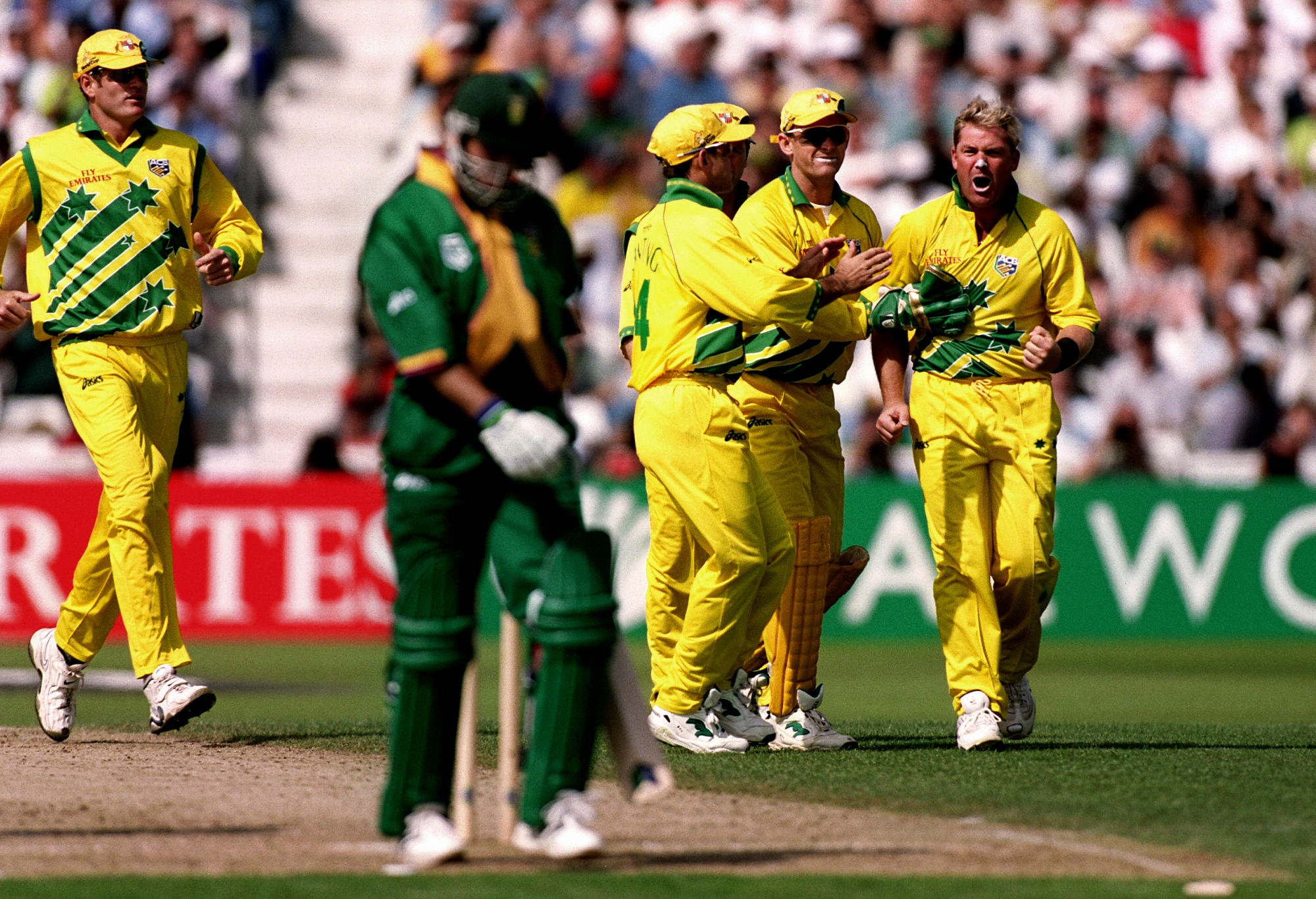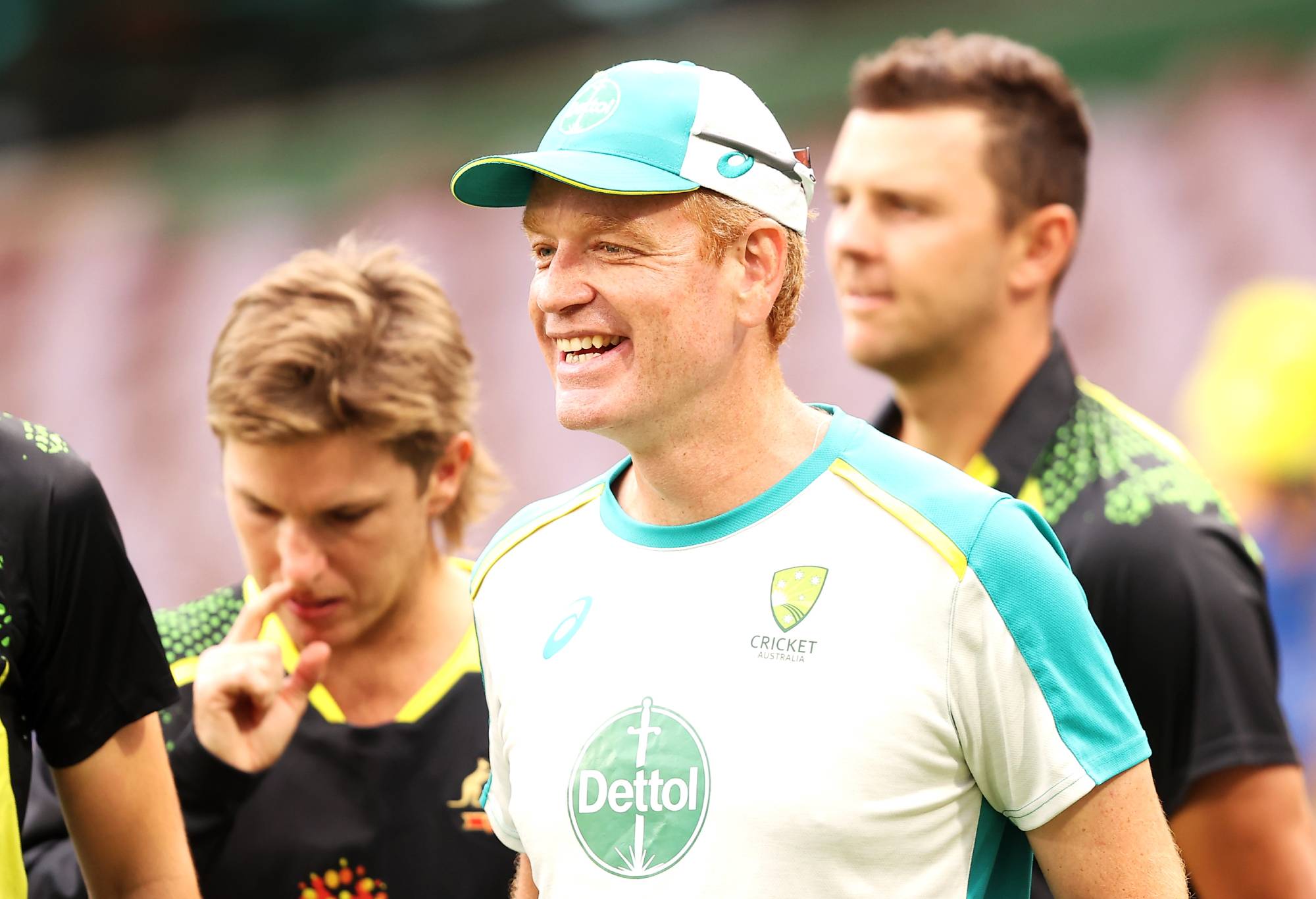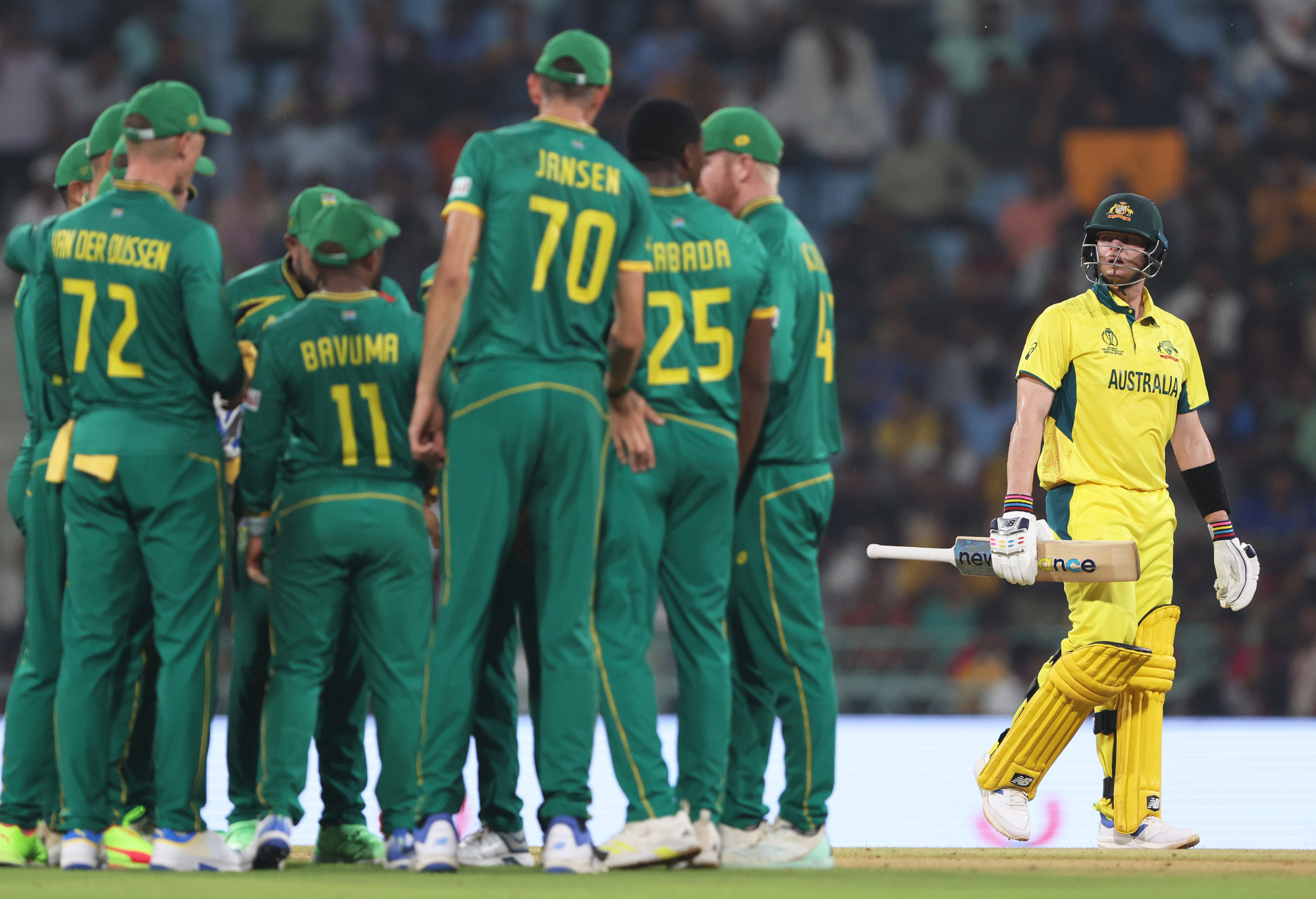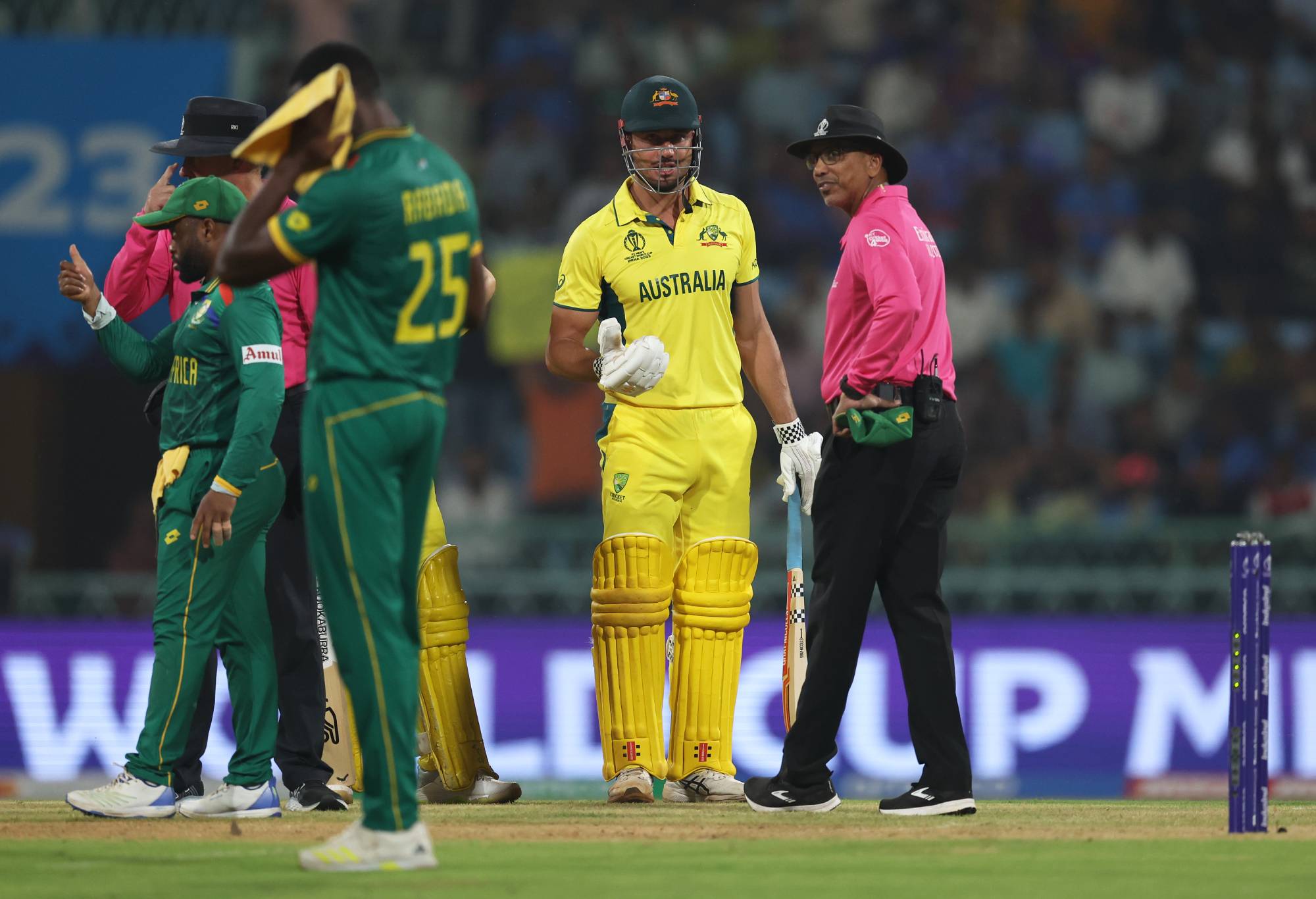
Australia’s World Cup campaign is not dead in the water but they’re going to have to party like it’s 1999 to even scrape into the semis after their pair of insipid displays to start the tournament.
Now is the time for strong leadership and after being part of the selection panel which chose a squad lacking in fresh legs and a second frontline spinner, the heat is on coach Andrew McDonald to salvage this sinking ship from oblivion.
Due to the 10-team format of this year’s World Cup in India with three nations not expected to trouble the top seven and their lopsided net run rate after back-to-back thumpings, Australia need to win six of their remaining seven matches, possibly all of them, to make the semis.
It’s a similar situation to 24 years ago in England when the Aussies got off to a sluggish start with losses to Pakistan and New Zealand before going unbeaten in their next seven matches to lift the trophy.
That team had all-time greats in Shane Warne, Steve and Mark Waugh, Adam Gilchrist, Glenn McGrath and Ricky Ponting complemented by Michael Bevan, Darren Lehmann, Paul Reiffel, Damien Fleming and Tom Moody.

Shane Warne celebrates a wicket during Australia’s win over South Africa in the 1999 Cricket World Cup semi-final. (Photo: Michael Steele/Getty Images)
The current Australian team also has plenty of big names but none of them are in form – most of the Test players look past their prime in the one-day format and they all seem tired after a hectic schedule over the past 12 months while the support players in Glenn Maxwell, Marcus Stoinis, Adam Zampa and Mitchell Marsh look rusty and aren’t contributing anything substantial.
There’s little Australia could have done about the crowded calendar in which they have gone from a T20 World Cup at home a year ago into Test series against the Windies and Proteas, a tour of India, the IPL for a few players, the World Test Championship final, an energy-sapping Ashes tour and a warm-up white-ball series in South Africa.
But their brains trust could have managed the situation a hell of a lot better by sharing the workload around and also getting some game time into the next generation of limited-overs stars.
With Pat Cummins, Mitchell Starc, Josh Hazlewood, Steve Smith, David Warner, Travis Head, Cameron Green, Alex Carey, Marnus Labuschagne and now Marsh mixing Test duties with a shorter format or two, it should have been obvious that the jam-packed schedule would catch up with them sooner or later.
To be honest, the majority of those players looked fatigued in the final couple of Ashes Tests and they look even more flustered in the early stages of what should be a showpiece event that is the culmination of years of planning.
While the likes of Nathan Ellis, Ashton Turner, Matt Short, Aaron Hardie, Matt Kuhnemann barely get a look-in for national duties, the Aussies have repeatedly gone back to the same group which has been together since they came up short at the 2019 World Cup in the semi-finals.
Winning the T20 World Cup unexpectedly in the UAE with the established veterans in 2021 has given the selectors the excuse of continually going with the same players across all formats when the big tournaments are on.
But there’s always a major event just around the corner for a major nation like Australia, which sandwiches in regular lucrative showdowns with England and India alongside the many ICC events in cricket’s never-ending calendar of trophies.
The Australian senior players got their way at the start of last year when Justin Langer walked before he was pushed and McDonald was installed as his predecessor.
It seemed a convenient appointment at the time – go with the guy who is already part of the set-up rather than scouring the globe for the coach with the best credentials.

(Photo by Mark Kolbe/Getty Images)
Whenever the host broadcaster’s cameras have panned to McDonald during this World Cup after an Australian blunder in the field, his expressionless demeanour can be seen one of two ways – he’s remaining calm in a time of upheaval or his lack of a reaction is another example of his refusal to be critical of the players.
It’s easy being head coach when you’re enjoying a home summer against the West Indies, it’s time like these in the furnace of a World Cup in India when you’re facing elimination at 0-2 that McDonald needs to prove he can come up with a plan to get the team out of this hole.
Every team makes the occasional fumble but the Australians have been sloppy for the past few months, stretching back to the Ashes fade-out in which they were ultimately fortunate to retain the urn with a drawn series.
The six dropped catches, mixed in with some amateurish ground fielding in the 134-run capitulation to South Africa was an inexcusable display from a team that used to set the standard in this area of the game.
Players were laughing after spilling chances. While they don’t need to do the old club cricketer trick of swearing profusely if they drop a catch to make sure everyone knows they’re disgusted with themselves, it looks bad to be repeatedly lighthearted when a team is playing so poorly.
It wasn’t until Marcus Stoinis dropped an absolute sitter to complete the team’s embarrassing display of inept fielding that there were annoyed expressions all round.
Such poor fielding is a sign of a team that is not switched on. Whether that’s due to the fatigue factor or poor preparation, the coach’s remit is to come up with a solution to a glaring problem.

Steve Smith departs. (Photo by Robert Cianflone/Getty Images)
None of the Australian players are the kind you need to hide in the field but collectively they’re well short of expectations.
Attention to detail is lacking. Cummins botched his bowling changes with Starc, their best bowler for the closing stages, only getting through nine.
The skipper has looked frazzled since the Poms fought back in the final three Ashes Tests and while it is too simplistic to say that a fast bowler can’t be captain, the workload of that role plus the leadership duties across two of the three national teams looks unmanageable.
Whether it’s Marsh or a younger option, this will surely be Cummins’ last tournament as a white-ball captain – he doesn’t need the burden and it’s lessening his impact.
The decision to drop Alex Carey as wicketkeeper after the first-up loss to India is another sign that this team is all over the shop.
His form has been down in recent months but bringing in Josh Inglis was a gamble which backfired – his glovework was OK although he nearly shelled a simple catch off Heinrich Klaasen and he made just five, batting at five.

Marcus Stoinis interacts with umpire Joel Wilson after being dismissed. (Photo by Matthew Lewis-ICC/ICC via Getty Images)
Australia’s World Cup campaign has screamed of an “end of the road” moment for months – it was barely mentioned by the players in the first half of the year as they focused on the Border-Gavaskar Trophy, World Test Championship final and Ashes blockbuster.
They can’t afford to drop either of their next two matches to keep the unlikely dream alive of emulating the 1999 side’s return from the brink but the schedule has not been kind to Australia.
Sri Lanka are next up on Monday at Lucknow, the scene of Australia’s Proteas pummelling, before they travel to Bengaluru on Friday to face Pakistan.
The Aussies will then need to account for the Netherlands before crunch clashes with New Zealand and England which are likely to well and truly decide their semi-finals fate before their last two group games against Afghanistan and Bangladesh.
On current form, they will be lucky to finish in the top six let alone the final four.
Paul Suttorhttps://https://ift.tt/Lgb0u3z on McDonald to show he can get bumbling Aussies firing again after insipid World Cup performances
Post a Comment